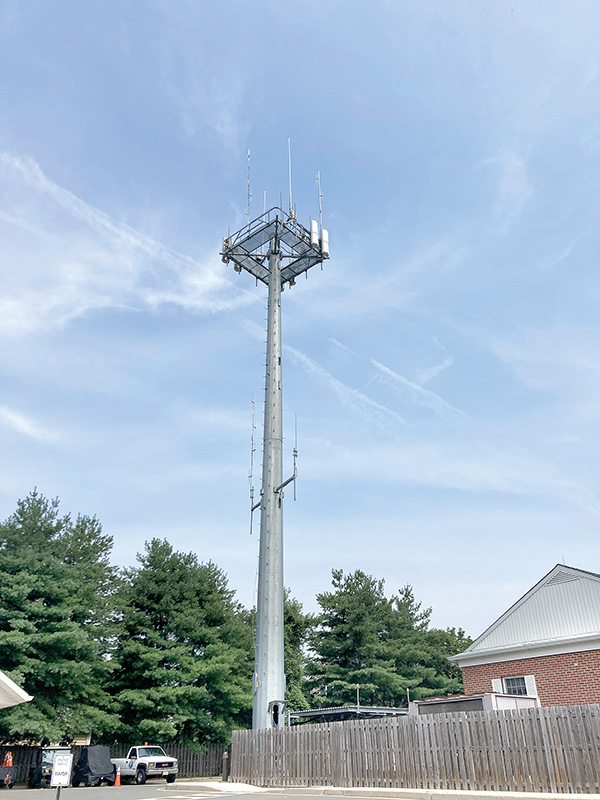
By Allison Perrine
LITTLE SILVER – Borough residents are no strangers to the largely unpopular cellular tower in town. When the tower was erected in 2017, many voiced concerns about it being a potential eyesore they also feared would pose health risks to the neighborhood.
Those impassioned testimonies again echoed in council chambers this week when the borough council had a special meeting to discuss its latest conversations with Verizon Wireless, which is looking to install new equipment on the 95-foot monopole. Specifically, it’s looking to replace the six existing nodes, or antennae, on the tower and install an additional six to improve coverage in the area.
Mayor Robert C. Neff Jr. recognized that the idea would not be popular, but in order to get Little Silver residents a public hearing on the subject with Verizon representatives, approving a resolution for a tolling agreement with the wireless network operator was necessary. That’s why after meeting in executive session July 26 to discuss the agreement, the council approved the resolution.
“We’re dealing with some very difficult federal law,” said Neff.
“We kind of start with the deck stacked against us.”
The tower currently sits behind town hall off Prospect Avenue, not far from Markham Place Middle School and residential homes. It serves the borough’s emergency service teams as well as public works, state police and county hotlines. Its installation in 2017 replaced a former 60-foot tower in the same location and was constructed by Verizon for about $150,000.
It quickly caught the attention of those in town and, soon after its installation that May, residents formed a group on social media, Little Silver Against the Cell Tower, in hopes of educating others in the community about the issues associated with the tower; ensuring elected officials remain transparent about the approval process through contract negotiations; and seeking to “immediately cease” cell tower operations by the following school year, its Facebook page states. While the goal of halting operations did not come to fruition, the group remains active. As of press time Wednesday, it had 419 likes on the page and 452 followers.
There’s also a Facebook page of Little Silver residents who support the cell tower, but with notably less support; as of press time Wednesday it had 27 likes and 34 followers.
A year later, in 2018, the council introduced legislation to set procedures for telecommunication companies looking to site wireless service facility equipment and wireless poles within a public right-of-way. In it, officials cited the Federal Telecommunications Act (1996), which preserved a municipality’s ability to manage the public rights-of-way as well as the construction and modification of personal wireless service facilities.
“Phone companies don’t necessarily need giant cell towers anymore,” Neff said in 2018 when the ordinance was introduced. “They have new devices, small boxes that attach to telephone poles, and that caused us to raise some questions. Is there a formal notification process? Can a telecommunications company put up a box and not tell anybody? Now, in Little Silver, they can’t. They’ll need permission.”
Fast forward to this summer, when Neff said the borough has had some pushback from cell tower companies arguing that it can’t prevent businesses from installing additional equipment on the tower. The borough has resisted that notion that it could be done without a public hearing. He added that AT&T expressed some interest in installing equipment on Little Silver’s tower. The borough politely declined, Neff said, but AT&T still has the power to sue the borough – as does Verizon.
That’s why the borough went forward with the tolling agreement, he said. It puts off the time that Verizon would have to sue the borough so that the two parties can work together to get a public hearing on the company’s plans before any work would be done.
Regardless, several residents expressed their frustrations about it to the borough council that night. Roberta Santos said she is still very upset and disappointed that the borough “sold out to Verizon” years ago and that these issues are arising today.
“It’s very disconcerting to me. I have neighbors with cancer,” she said, noting a common concern about the potential unknown health risks that could be associated with radiofrequency waves. According to the American Cancer Society, “At this time, there’s no strong evidence that exposure to RF waves from cell phone towers causes any noticeable health effects. However, this does not mean that the RF waves from cell phone towers have been proven to be absolutely safe. Most expert organizations agree that more research is needed to help clarify this, especially for any possible long-term effects.”
Resident Alicia Holmgren, whose property is 200 feet from the tower, said she felt “numb” sitting in the council room that evening after hearing that AT&T was interested in putting equipment on the tower. She created the Facebook group Little Silver Against the Cell Tower and said when it started, her children weren’t in public school yet.
“My youngest is now starting kindergarten. She wasn’t walking when we started this,” said Holmgren. “I am just disgusted (by) what has happened here.”
This article originally appeared in the July 29 – Aug. 4, 2021, print edition of The Two River Times.














